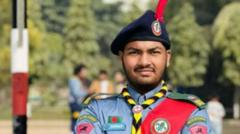In alarming developments since the beginning of the Ukraine conflict in February 2022, returning Russian soldiers have reported being scammed and deprived of their pay by corrupt officials and police. Many enlisted, drawn in by the financial incentives offered by President Vladimir Putin, who has dramatically expanded the armed forces during this ongoing conflict.
Russian Soldiers Fall Victim to Scams and Theft Upon Return from Ukraine

Russian Soldiers Fall Victim to Scams and Theft Upon Return from Ukraine
Scandals surrounding the treatment of returning soldiers expose deep-rooted issues within Russian military and government systems.
Among the soldiers is 39-year-old Nikita Khursa, who joined the effort mainly for the lucrative rewards: nearly 5.2 million roubles (£47,000) for the first year of service and bonuses for injuries sustained. Khursa, originally a welder from Rostov, was grievously injured shortly after joining the fray and intended to utilize part of his financial compensation to purchase an apartment with his wife, Oksana.
However, a series of unfortunate events began when Khursa had an argument with his wife and left their home inebriated, cash in hand. While driving to Rostov to buy an apartment, he fell victim to police extortion, losing a staggering 2.66 million roubles (£24,000). The officers, dismissing Putin’s declarations of respect for returning veterans, demanded a bribe when they noticed the cash.
As reported by the BBC, incidents of returning servicemen being preyed upon by criminal taxi drivers—who were tipped off by airport police—have also surfaced. The soldiers would often be charged astronomical rates, sometimes threatened or incapacitated to facilitate theft of their bank cards and funds.
Even before getting their hard-earned cash, some soldiers had their pay intercepted by corrupt recruitment center officials, who manipulated access to soldiers’ salary accounts using stolen sim cards. Allegations have also arisen suggesting that soldiers were robbed directly by their commanding officers, who forced them to surrender their bank cards.
Khursa's report to the police about his ordeal lead to charges against the officers involved; however, with the tactical avoidance of legal repercussions—enlisting for duty in Ukraine—these individuals were never prosecuted.
Despite enduring trauma, both physical and financial, Khursa expresses a resigned acceptance of his situation. With an uncertain future awaiting him due to government policies keeping soldiers in service until the end of the conflict, he reflects on his situation and the systemic issues he has faced.
"My wife and I are separated now," he mourns, contemplating the grim prospects ahead. "Only the army saves you, puts a roof over your head.” As Russia grapples with its ongoing military commitments, many returning servicemen like Khursa are left to navigate a treacherous landscape of corruption and betrayal.
However, a series of unfortunate events began when Khursa had an argument with his wife and left their home inebriated, cash in hand. While driving to Rostov to buy an apartment, he fell victim to police extortion, losing a staggering 2.66 million roubles (£24,000). The officers, dismissing Putin’s declarations of respect for returning veterans, demanded a bribe when they noticed the cash.
As reported by the BBC, incidents of returning servicemen being preyed upon by criminal taxi drivers—who were tipped off by airport police—have also surfaced. The soldiers would often be charged astronomical rates, sometimes threatened or incapacitated to facilitate theft of their bank cards and funds.
Even before getting their hard-earned cash, some soldiers had their pay intercepted by corrupt recruitment center officials, who manipulated access to soldiers’ salary accounts using stolen sim cards. Allegations have also arisen suggesting that soldiers were robbed directly by their commanding officers, who forced them to surrender their bank cards.
Khursa's report to the police about his ordeal lead to charges against the officers involved; however, with the tactical avoidance of legal repercussions—enlisting for duty in Ukraine—these individuals were never prosecuted.
Despite enduring trauma, both physical and financial, Khursa expresses a resigned acceptance of his situation. With an uncertain future awaiting him due to government policies keeping soldiers in service until the end of the conflict, he reflects on his situation and the systemic issues he has faced.
"My wife and I are separated now," he mourns, contemplating the grim prospects ahead. "Only the army saves you, puts a roof over your head.” As Russia grapples with its ongoing military commitments, many returning servicemen like Khursa are left to navigate a treacherous landscape of corruption and betrayal.
















